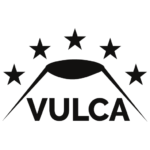JASON EXPLORING BeNeLux MAKERSPACES
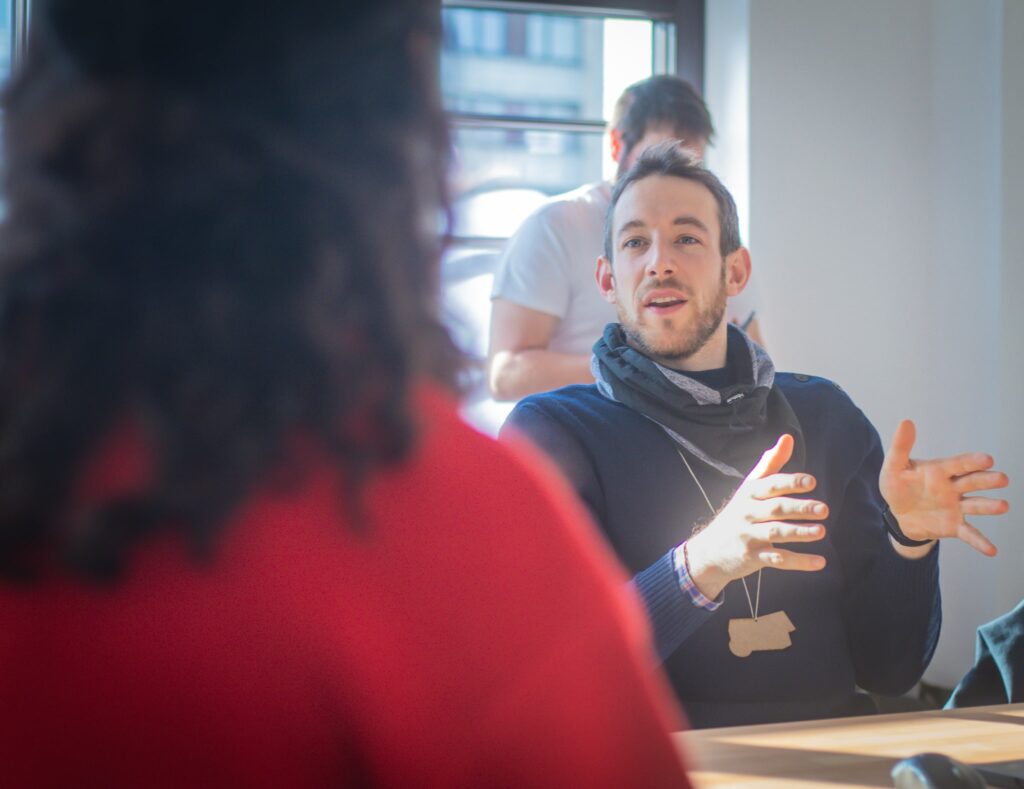
Jason, exploring BeNeLux A new explorer start his journey in 2024, supported by VULCA Jason, Belgium maker located in Brussels, wants to explore makerspaces, fablabs and hackerspaces all over the BeNeLux. Let’s learn more about him and his coming tour We met Jason during a maker event organised by RFFLabs in Paris. It was in OctoberMake 2023. The month after, Jason took his ticket to join Vulca Seminar in Ljubljana (Slovenia). Quickly, Jason started to open the discussion with us to see how he could contribute to Vulca in his part of Europe. Jason want to better understand the maker movement in BeNeLux, so naturally, we proposed him to join our team of makerspaces explorers In 2024, Jason will be exploring every months new makerspaces, Fablabs and Hackerspaces starting with BeNeLux over weekends. Located in Brussels, Jason will mostly travel using public transports such as train, bus. Vulca team group picture Jason, tell us more about you I come from a family whose mantra is : “You own what you have in your hands and in your head; the rest, people can take it away from you.” I very much embrace this belief that know-how and knowledge are our only possessions in life, proof is, these are the only things we actually take to the grave. Since I am 12, I have been dreaming of an open workspace on the district main square where everyone can bring their stuff and repair it together with the others. I believe in a world where everyone has access to everything and when I discovered fablabs, I figured that the open workspace + digital fabrication is the future I was dreaming of so I’m fully in. I believe in a world where human & relationships come first, so I’m now visiting fablabs across the BeNeLux to weave relationships and build this network and this community at the heart of Europe. Also I’m meeting maker/fablab communities as much as I can from across the world from Japan, India, Rwanda, Kenya, Tanzania, Europe, … Jason participating on an Escape game made by Navid and Leon I am a Belgian engineer curious about everything, hyperactive and dreaming of a world where everyone is free to be curious, to be creative and to exercise their critical mind. I value intellectuals who make and makers who think, so you can find me or get me hooked talking about philosophy or hammering & welding things together. I love board games, learning languages, discovering new perspectives and imagining better futures. When I’m not visiting labs, I work as a freelancer in Product & Strategy for MedTech & Digital Health companies and I am building a company in prevention in orthodontics, Breeze Medical Jason & Aleksandra – Vulca Seminar Slovenia My journey in fablabs I did the FabAcademy in 2021 in Brussels and started meeting the Fablab Network community. I did it with the objective of building a digital microscope that could be locally manufactured in Africa to diagnose among other things, malaria. I ended up making a foldable 3D scanner but learned a ton of things on the way thanks to Quentin Bolsée. Nevertheless, at the end of 2021, it was time to continue the microscopy project and I left for Tanzania where I printed my first African digital microscopes with my good friend Valerian Sanga (member of GOSH) Then I went to Rwanda where I kept visiting Medical labs with Maurice and fablabs where I met Dany, Olivier, Héritier, Lambert, Frédéric and many others from FabLab Rwanda. Back in Brussels, I started visiting the different labs of Brussels. Then in 2023, I went to Bhutan for the FAB23 where I met Constance, Rico, Matthieu, Haflidy, Hafey, Nanditha and so many others and continued with visiting some Indian labs. After that, Constance invited me to participate to OctoberMake in Paris where I met even more incredibly cool french makers including Alexandre who invited me to the Vulca Seminar in Ljubljana where I met again some of the folks that I knew from the Fab Network and plenty of yet new places. After all of this, and having a great match with the Explorer approach of Vulca I joined as Explorer. Jason, introduced to Vulca community during the seminar I am also looking at businesses that run through digital fabrication and embrace free software & open source movement such as Mekanika or Ugani Prosthetics. Here with Joren from Ugani Jason, exploring BeNeLux In 2024, Jason plan to visit over weekends fablabs, makerspaces and hackerspaces in Belgium, The Netherlands and Luxembourg. If you want to welcome our explorer in your city in 2024 and better connect you with the European Maker movement, please contact us.
AXEL EXPLORING EUROPEAN MAKERSPACES
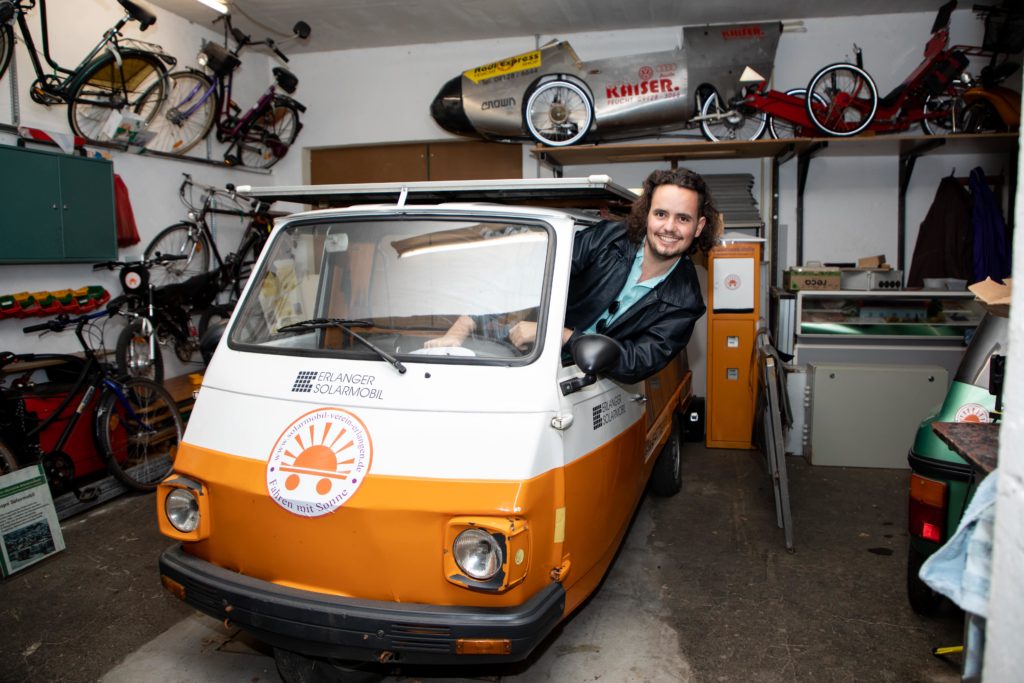
Axel from Germany, explores European makerspaces in 2023 with VULCA and make a 360° panoramic of your makerspace.
DANIEL, EXPLORING POLISH MAKERSPACES
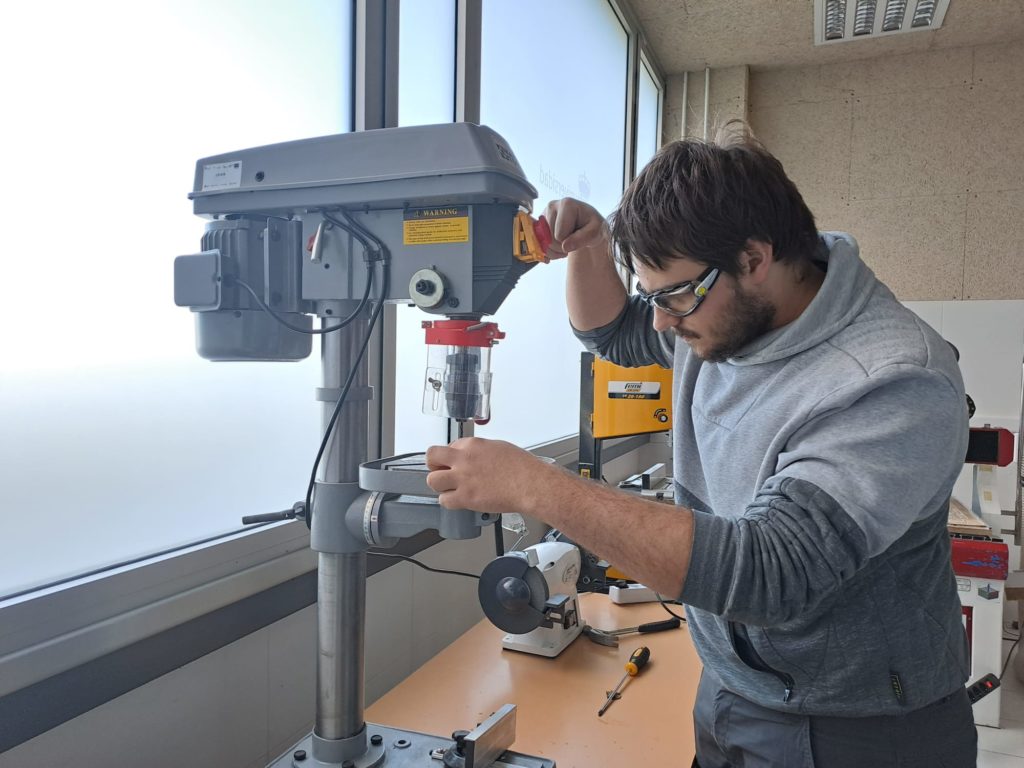
Daniel from Spain, explores Polish makerspaces in 2023 with VULCA.
Welcome REMI
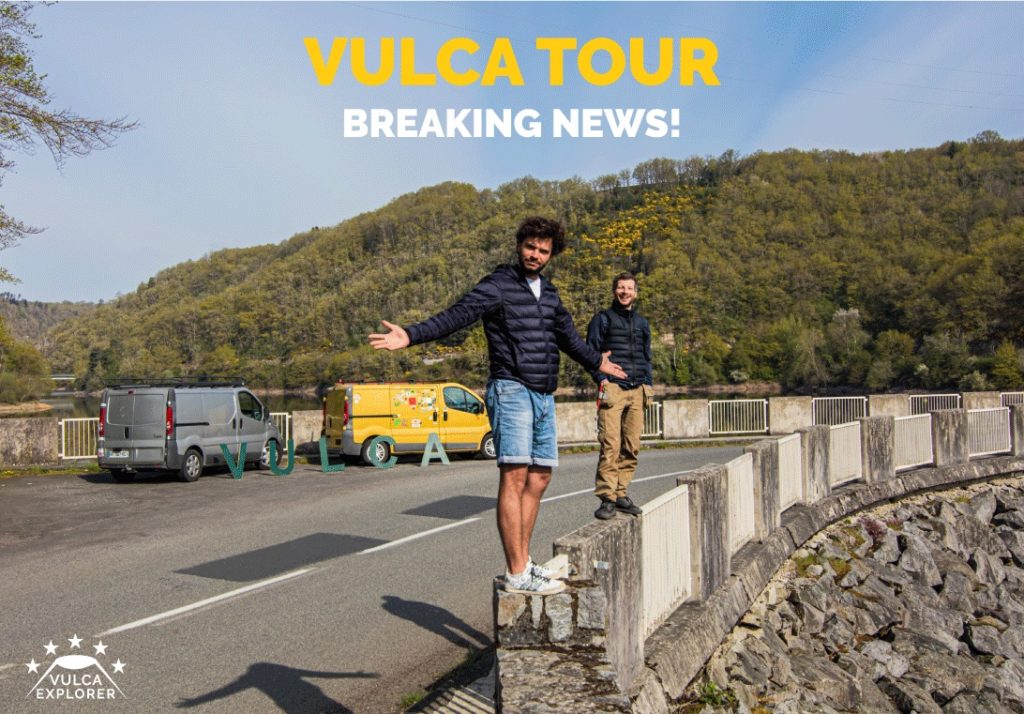
Welcome REMI 🚐 A new explorer start his journey, supported by VULCA and RFFLabs With his grey van, Remi prepare his EUROPEAN VULCA TOUR of Fablab, Makerspaces and Hackerspaces. He started in France in 2021 with the help of the French Fablab Network (RFFLabs). Today, in 2022, his wheels are warm enough to drive in neighboring countries. REMI MAUVOISIN The new VULCA EXPLORER on WHEELS ! Remi tell us a bit more about himself « My name is Rémi and I was born in the mid-80s. I grew up in the south west of France with my brother where our parents taught us the art of making, sharing and curiosity. After building tiny houses, repairing motorbike and hacking computers in my village, I discovered the city while studying in Bordeaux to become a technology teacher. Indeed, I wanted to continue hacking, tinkering, recycling while sharing this with others and the educatio system was perfect for it. For 15 years, I’ve been doing school projects, concerts in Parisian venues, helping my friends building their houses, playing alternatively basketball and football, reading a lot about low-tech philosophy and piles of wood cut in winter to keep me and my family warm. I decided to turn towards other horizons, while keeping this desire to share my experiences and my skills, by being more interested in the new ways of doing things FabLabs and makerspaces. So here I am, on the road to meet people and their projects, in order to create a link between all these initiatives, before embarking on this adventure myself! » Remi preparing his next VULCA TOUR His first tour out of his native country will be during +3 weeks in North of Spain. (You can see the road map below). For Remi, touring in Europe is a wonderful way to learn new language, meet other culture and understand the different model of open-workshop, before to get back to his family village, in the south ouest of France and start also his Open-Workshop including a space for makers in residency. As Alex.R is currently doing with Mountain Makers. REMI’s FIRST TOUR IN SOUTH OF FRANCE AND NORTH OF SPAIN If you are in his road, contact Remi. He can probably make a stop in your city or village. ALEXANDRE ROUSSELET Just a few words about our FIRST VULCA explorer. Even if he started hitchhiking or by bus/train/plane with Nicolas between 2015 and 2016, he quickly decided to buy his own van. Indeed, the van allows the VULCA EXPLORERS to go to every village or rural area, such as FabFarm in Algarve (south of Portugal) or Pralnia MakerSpace in Sokolowsko (Poland) or visiting Tzoumaker, in Kalentzi (Greece). Alex has driven for +150 000 Km in 36 Countries, visiting +400 makers communities, which make VULCA one of the most connected NGOs to the Europeans Makers movement so far. Now Remi and Alex will work and explore Europe together. Each of them will make their own roadmap. They will also participate and represent VULCA in as many as possible European Makers Events, promoting Makers Mobility and the concept of Residency for Makers that should be more common in European Makerspace and Labs. For the maker movement, each VULCA TOUR is a chance to be connected to each other with the help of an explorer that make the link. Indeed, our makerspaces explorers allow better connection for those that need to be more linked in order to learn, make and share together. As an exemple, Constance Garnier was personally connected to 13 European Fablabs to finish her research in 2019. Or also, Buinho was connected to Fablab Cuenca for a EU project that they got in 2021. Or Navid Lari, a Belgium Makers from Open Fab found his residency in Fablab Vagur (Feroe Island) in 2022. Navid Lari, The picture below wouldn’t exist if our explorers wouldn’t be on the road meeting Fablabs and makers to match-make them. Navid, a Belgium Maker in Residency in Fablab Vagur (Feroe Island) Remi and Alexandre, Are on the wheels and ready to drive until your Fablab, Makerspace, Hackerspace or Open-Workshop. They would be also pleased to take part to your conference, seminar or hackathon and share with you and your audience, what they have seen in hundreds spaces in Europe. The best way to meet them ? Contact us here
#MakersForSolidarity

Since the end of February 2022 and the commencement of war in Ukraine, Vulca started working more closely with the makers’ community to search for solutions for displaced Ukrainian makers, and those who are still in Ukraine. In this article we will share what was done, and how you can help.
The development of a platform dedicated to makers’ mobility.
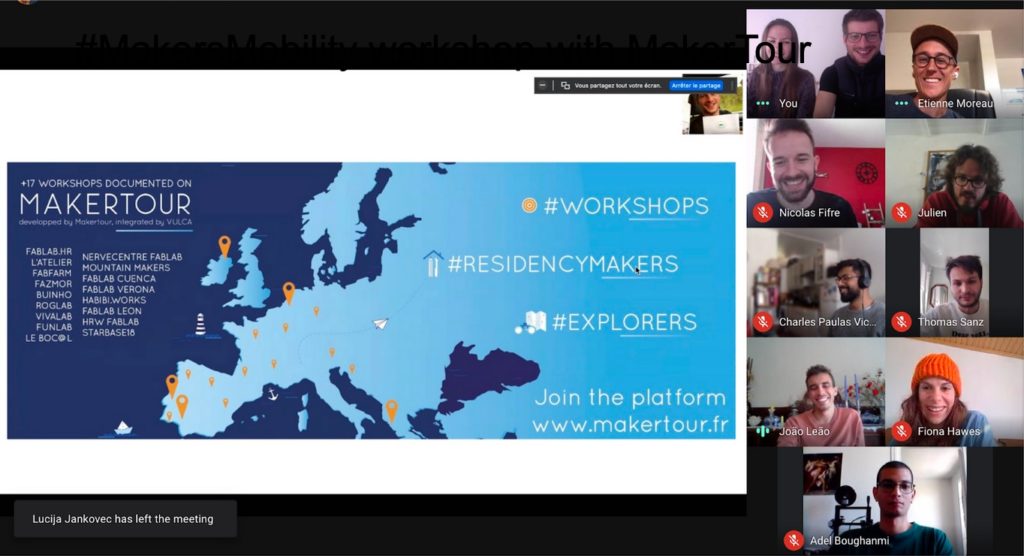
In 2021, Vulca merged with a French NGO – MakerTour – that gave us the platform they developed (https://www.makertour.fr). This platform was initially used for documenting fablabs and makerspaces all over the world with an emphasis on different projects they run within their space. As a Vulca NGO, we are very interested in assessing existing programs covering makers mobility and in facilitating the mobility of makers, so we started to extend this documentation, to eventually create a go-to platform for makers looking for residency opportunities. The infrastructure this platform had was already a good start for us, and we found a way to use it for promoting makers’ residencies. However, we want to further develop the platform, adding new functionalities to help makerspaces highlight their residency offers and to help makers find them. The objectives of such development : Our main objective is to identify if such a platform can be useful for makers and makerspaces, and how to make the platform more usable for residencies. Over the past year, we have been conducting rather interviews with independent makers and makerspace managers, to try to understand what are the needs of the community, and how the platform should evolve to meet those needs. Following the initial feedback, we identified the necessary steps: Developing a methodology to collect the users’ feedback in an analyzable way; for that we will make a first round of interviews with vulca members. Based on this methodology we will extend the interviews to all users of the platform, revisiting the methodology if necessary. With this data we will define a list of news functionalities we will later develop on the platform. We will organize a focus group during our seminar to check these news functionalities before developing them. What has been achieved so far? Few months ago, a group of MSCc students from Rennes School of Business contacted Vulca because they were looking for a real case study project, where they contribute to solving a problem that could have a positive impact on society. They got interested in the MakerTour project, so we decided to collaborate with them in the improvement of this platform. It is important to say that for the development of this research the participation of students was crucial, especially taking into consideration their knowledge in Creative Project Management, Culture and Design. Their conclusion that can be found in the report is the following one : To answer this question, we have been organizing a series of interviews with experienced and new users of the platform. The plan is to interview at least 5 makers and 5 makerspace managers to identify their needs. So far, three of each have been interviewed and we are using these insights to create Customer Journey Maps that will help us later to suggest the new functionalities of the platform. The reasoning behind focusing on the functionalities to improve visibility and accessibility of the Maker Residencies is to better solve the problem Vulca and MakerTour are facing. In accordance with original interactions with the teams behind the projects and with the first results, the makers and makerspaces agree that the biggest change that the Makertour platform should undergo is to ease-of-use and to share the experiences with others. From the group of students. After 5 months of work, this group of students was able to define the methodology for Vulca on how to collect users’ feedback. They designed the questions for the interview, and developed the pipeline of collecting and analyzing data. In the future, we will continue organizing the interviews to collect more feedback that will eventually lead to development of new functionalities. If you have used the platform makertour.fr to find residency’s opportunity feel free to contact us on Facebook or Twitter. Your experience will be helpful to develop a platform dedicated to makers’ mobility. During our next Vulca seminar we will present the result.
Media Library

We have in stock about 100 videos and thousands of picture of visit from our +350 M_Hackerspaces visit.
Every week we’ll add some of them in our library !
Vulca What’s next?
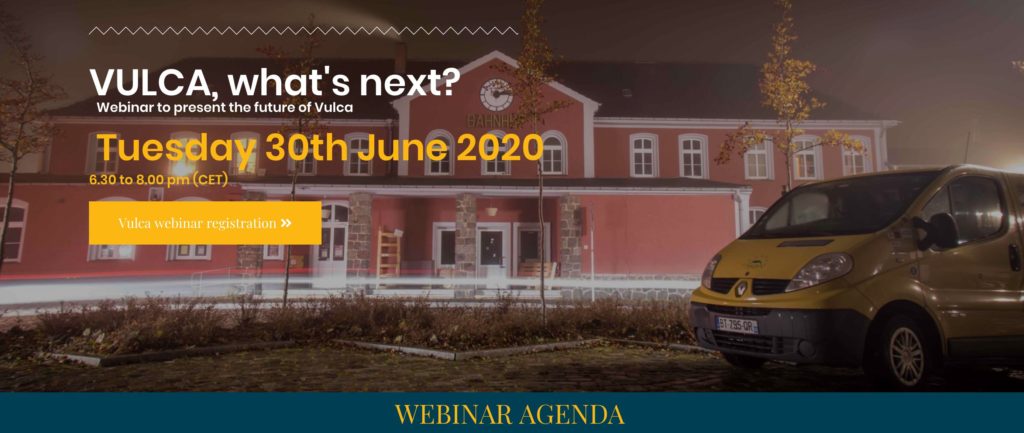
VULCA, what’s next? Webinar to present the future of Vulca Tuesday 30th June 2020 6.30 to 8.00 pm (CET) Vulca webinar registration WEBINAR AGENDA VULCA NEW BOARD 10 minutes – Lead by Nicolas Fifre Our historical board will be changing after 5 years. Since the beginning of Vulca, the members of our board have been: Nicolas Fifre, Co-Founder and President, Louis Reignaud, Treasurer, and Marjorie Ansion, Secretary We are very happy that they have been part of Vulca journey, contributing to the development of the association. However, their life started moving into a new exciting direction making them less involved in the association’s activities. That is why they would like to leave their respective places to people that will bring new energy and involve more into the association to better represent the Community. Discover who are the new faces of Vulca Board Vulca webinar registration VULCA SEMINAR 20 minutes – Lead by Aleksandra Sljukic and Roberto Vdovic Each year Vulca organises a seminar in another country to create time and space where the community can meet and discover the local makers movement. This year, we had to postpone it, but we have some good news and announcements. With the team from Fablab.hr and Croatia, we will organise the 4th seminar in Zadar, Croatia. Join us to learn more about the agenda, how to participate or become a volunteer. Vulca webinar registration VULCA TOUR 10 minutes – Lead by Alexandre Rousselet With 150 000 kilometers travelled and more than 330 M_Hackerspaces, Fablabs and Open Workshops visited, it is time to prepare the future of VULCA TOUR. Join us to know where the next road will take us and how to make sure we visit your space. Vulca webinar registration VULCA EXPERIMENTA 40 minutes – Lead by Thomas Sanz We are so excited to introduce you our new tool to developp the M-Hackers Mobility in Europe; With Experimenta we will go in the heart of M_Hackers in residency and share to you the best practice found ! Don’t miss our webinar to learn more about it! Vulca webinar registration We will conclude this webinar with Q&A to answer all of your questions. Vulca webinar registration Make sure to register not to miss the notification for the webinar
Open Door Manzat Experimenta
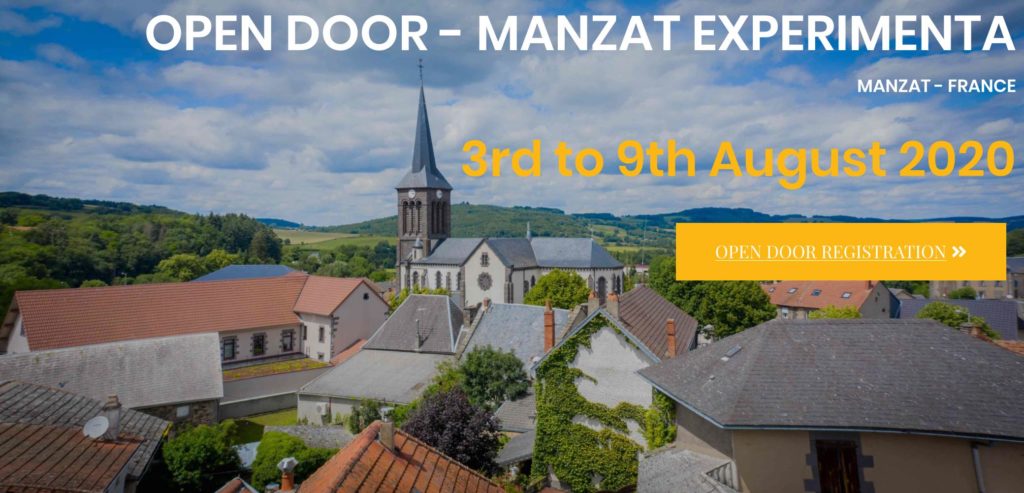
OPEN DOOR – MANZAT EXPERIMENTA MANZAT – FRANCE 3rd to 9th August 2020 REGISTRATION IS CLOSED (but you can contact us for the next open door) Vulca Experimenta methodology includes one week immersion in the town of our Proof Of Concept partners. We know how much is important to see on spot the community and their dynamic to really understand it remotely. So we offer an unique experience to those who want to visit a Makerspace project which starts by including residency for M-Hackers from the beginning. The first open door week will be organized in Manzat (Fr) and we invite our network to join the future Makerspace including 6 residencies for m_hackers between the 3rd and 9th August 2020. (The next open door will be in 2021 in Casa Branca – Portugal) 1 week immersion in Manzat to experience in real condition REGISTRATION IS CLOSED (but you can contact us for the next open door) Weekly planning overview MorningS Working group & Workshops, we will discuss and share experience with each other. AfternoonS Depending our skills and knowledge we will work on renovation. Take your gloves and dirty clothes. EveningS Sightseeing in the region. Make sure to bring your swimsuit, tuba and sun glasses REGISTRATION IS CLOSED Computer Aided Design We will need to 3D model differents things. We plan to provide a couple of 3D printers on spot ! Your CAD skills will be helpful Renovation Laying a concrete slab, dealing with pipeline and electricity, cutting wood and metal … you should find something to put your strength on it here Communication & Translation We want to write and translate the project into several languages (to make it easier for anyone to understand). Having multilingual community on spot is an opportunity we don’t want to miss Meeting and sharing Importantly, we want this week to be a unique opportunity for local citizens and international M_Hackers to meet and share experience. REGISTRATION IS CLOSED Meet the local community This is the local community that start to grow and see here a representative panel of them Brice Lucile Axel Amandine Flo’ Christel Angel Valentine Corentin Michel Alex Emma Yves Marjorie Everyone new comers arriving anytime during the week will have a dedicated time with a local volunteer to visit the village, the future Makerspace & residencies + the room to stay. Meet international M_Hackers They already booked their week to come to Manzat and learn more about this local project supported by Vulca Experimenta Nicolas (Be) Aleksandra (Sr/Hr) Julien (Be) Rasmus (Dk) Emilie (Fr) Bartek (Pl) Marta & Franek (Pl) Delia and Micka (Esp) Alex (Fr) Stephane (Breton 🤘🏼) Paco (Esp) Joanna & Marcin (Pl) REGISTRATION IS CLOSED (but you can contact us for the next open door) Frequently asked questions How many days should I stay? You can stay from 1 to 7 days. As you wish we will welcome you in Manzat. Just make sure to arrive between 3rd and 9th August How much should I pay? Accomodation: We can host up to 20 people for free. Transport: You should pay your own travel expense (Since you arrive in Clermont-Ferrand, we will take care of you to bring you to Manzat for free). Meal: It will be a participative budget for financing meal for everyone. 2 to 3 times during the week we will all together go to the local market or buy food to local farmers. Then we will cook together. How to arrive in Manzat? Travel Manzat is located 30 min far from the city of Clermont-Ferrand (the biggest city of this region). Manage to reach this city and we will catch you up there Paris or Lyon have good connections have both good connection to Clermont-Ferrand. There are several ways to reach Clermont-Ferrand then even by bus, train or sharing cars. This plateform is a good start for you (Don’t hesitate to contact Alexandre Rousselet to help you)https://www.blablacar.fr/ What should I bring with me? You will be invited to help on renovation, so it would be great if you come with your own glows and dirty clothes. Also we will do some work office ! Don’t forget to take your laptop ! We will enjoy the countryside (lakes, rivers, forest, farms …) Please, take some good shoes, your swimsuit and sunglasses. MANZAT & AROUND TO SEE Chain of volcanoes that you can visit or even swim in their lakes, crossing giant viaducts on a sharing bike or explore the tons of small old Bridge from roman empire, enjoy all the Rivers and the national parc of the « Chaîne des Puys ». Don’t forget to visit the famous Michelin Museom or Vulcania ! Précédent Suivant MANZAT & French Specialities Cheese, Baguette, Snails, Wine ( … ) The French gastronomy is known all over the world for its quality and diversity. It is the fruit of a secular heritage and is also constantly evolving thanks to its professionals who continue to revisit their classics to always surprise and satisfy us. IIn Manzat, we will visit local productors, cheese farm and eat their daily product during the week To reach Manzat The main city is « Clermont-Ferrand – Auvergne ». Target this city and we will pick you up ! Otherwise the place is :14 rue des Ecoles 63410 ManzatAuvergne, France Contact: Alexandre Rousselet – Alex@vulca.eu REGISTRATION IS CLOSED (but you can contact us for the next open door)
The first connection, the hardest one

Since the beginning, Vulca has been regularly requested to create connections between people and/or spaces. If at the beginning we did “on the go”, gradually we have developed a specific methodology with a focus on human proximity. Alquimétricos, maker organization originating from Brazil, contacted Vulca to help with establishing new connections in Europe. This is the story of how we did it. 2020 Update: Due to COVID-19 pandemic context, most events in Europe and around the world were postponed or canceled. Alquimétricos was invited to be part of Vulca network seminar in April in Zadar, Croatia. As this and other booked events didn’t have place, Alquimétricos is reaching the European community through an online content channel supported via crowdfunding at: https://en.goteo.org/project/toys-for-quarantine Iberic Peninsule the first step of the european development of Alquimétricos Alquimétricos was created with a specific concern: take quality, effective, inexpensive, and fun STEAM educational resources to the masses. The CNC revolution has come with a great promise to solve present time’s challenges. Finally, its popularization has broaden the gap between the product design-and-fabrication-capacity and the consumer, leaving in its way more tech obscurity. Therefore, the main challenge they tackle is not to develop more sophisticated technologies but to make them more appropriated to the general public. « …as 7 billion people facing unprecedented tech development, production means have never been so concentrated. But this situation is not a fatality, there are solutions. The collective design and sharing of didactic toys you can make yourself out of virtually anything you find at your local environment can give the opportunity to vulnerable communities’ children to develop most XXI century’s key skill. » European introduction to Alquimétricos started when Fernando, its co-founder, decided to come to Europe for a three-month trip. Initially, his agenda was: An invitation to participate at the Creative Commons Global Summit, La Casa Colorida in Nigrán, an activist collective in the Galician region in Spain had organized for Fernando and for a film-maker artist a residency during which they provided and documented around 5 workshops in educational, permaculture and counter cultural centers around the Pontevedra region. Finally, the MadNess Moroccan collective organized dedicated activities in Casablanca. To complete the European agenda, Fab Lab Benfica was the key link. They introduced Fernando to the Vulca team and from that on, something very powerful happened. Put humanity in connexion Andre Rocha, a manager of FabLab Benfica gave the contact of Alexandre Rousselet, Vulca co-founder, and the Vulca explorer to make connections with other M_Hacker(space)s. When we first got in touch with Fernando, we were amazed with his adventurous spirit – he came all the way from Brazil to Lisbon, and had a plan for three weeks only. Counting on « makers will recommend makers » really paid of as we quickly managed to make his 3 months full of experiences. We selected contacts on his itinerary, based on the map we created and on list of contacts. Our methodology to gather the large number of people is very simple. First, we create a new Whatsapp group to have a dedicated workspace with Fernando as moderator. Secondly, we put in our main Whatsapp groupa link to invite all the people that could be interested in meeting or have activities with Alquimétricos to join in. This kind of “small introduction” was useful to put a personal touch on those connections. Linking people this way is not always easy. In fact, if Whatsapp and email are tools that can reduce the spatial gap between people, the cognitive distance will be still present because, well – they don’t know each other. We assume those human introductions help with creating proximity between them. In this sense, it was easier to invite the second round of people, because most of the time, it was someone from the Alquimétricos’s Whatsapp group who invited their own contacts. In the end, Vulca intervened only at the beginning to push the initiative. Afterward, Fernando was able to lead. A roadshow with particular moments The Vulca core team analyzed the Alquimétricos project, the Iberian tour plan, and started putting Fernando through with Fab Lab contacts along with Portugal and Spain. In virtually every city he was supposed to stop by there was somebody from a Fab Lab to talk to. It was like somebody was putting tile under Fernando’s feet as he walked along. It was him who put Alquimétricos in contact with Vulca and started a chain of goodwill that led us to micro-residencies at FabLab Xtreme at Almendralejo, Badajoz, FabLab Cuenca in Cuenca, VivaLab in Porto and opened contacts in Madrid, Barcelona, Leon and more. Delia and Mickael hosted a 3 day program that included an introductory approach to the Alquimétricos technology, a deeper digital fabrication practice and a open activity in public space synched along a local traditional celebration. Perhaps the most dense maker stop in the trip was Lisbon. LX, as the locals abbreviates, hosts a bunch of FabLabs and makerspaces, each one with a different profile and business model. You can find FabLab Benfica, university-based linked with the education + industrial design grade students population, MILL’s (Makers In little Lisbon) an independant and diverse makerspace proposal downtown, FabLab Lisbon, an industry chamber + town hall joint endeavour, among other alternative garages, art ateliers and more traditional workshops. One of the most innovative discoveries during the trip was… cork! Yes, the ancestral material is especially abundant and developed n Portugal, the #1 world producer of the lightweight buoyant material. Companies like Amorim research their properties and develop crude and composite based solutions used in wine bottles as well as space shuttles. Visiting the factory, witnessing the industrial process and experimenting with the material at the FabLab was a delight and a transformative experience for a designes keen on sustainability Conclusion of Fernando Daguanno
